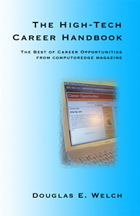Education-Experience
November 7, 2003
** Listen to this column
on your computer, iPod or other audio player **
Listen
| Listen
(Backup)
If you enjoyed this podcast, please
Vote
for Career-Op on Podcast Alley

Since I wrote my column about Apprenticeship
a few weeks ago, (See I
want an apprentice, September 12, 2003) I have received several
questions from readers wanting to know what they should be studying today
to build their high-tech career tomorrow. While it is impossible to predict
the future, there are several ways of preparing for a high-tech career
that will serve you well, regardless of where the industry might find
itself down the road. Over the next several weeks I will explore the ways
you can, and should, develop your own customized high-tech education.
Experience over everything
First, the most important education you can gather is that of direct,
hands-on experience. While formal classes can introduce you to new concepts
and teach you the fundamentals, only direct experience will cement your
understanding of a concept. I believe you can only truly understand something
by doing. This is the way you learn all the hints, tips and tricks associated
with a given technology. Even though I read voraciously, I find that I
don’t truly understand something until I put it to use in some fashion.
It is surprisingly easy to gather hands-on experience, too. You need not
be involved in a formal internship, although that is one way of getting
experience. In many cases, you will be generating your own projects so
that you can learn about a particular technology. There is nothing wrong
with this. Some of my most important learning was done on my own. It matters
little how you gain the knowledge, only that you do gain it.
If you want to learn how to install MySQL, give it a try. This is definitely
a skill that might come in handy in the future. Perhaps you want to hack
together a quick Perl program to track something on your web site. Whenever
you feel like learning something new, do it. This is the type of experience
that will serve you well, even though it doesn’t come from any traditional
educational structure. Better still, you can use these personal projects
as great “interview stories.” This allows you to demonstrate
your skills even if you haven’t used those skills in a work environment.
When I was interviewing for my first position at Walt Disney Imagineering,
they were looking for a combined PC/Macintosh support tech. While I hadn’t
ever supported Macs in a work environment, I was a Mac user myself. Beyond
that, I had also developed a few projects, including a Hypercard stack
about the Santa Monica Mountains. I was able to use these examples to
demonstrate my Macintosh knowledge even though they were personal projects
I had developed for the fun of it.
If you are currently taking classes, make sure you apply your new knowledge
as soon as possible after learning it. Not only will this help you to
get better grades, it will permanently internalize the information. From
that point forward, you will have the ability to call upon the information
as you face new challenges in the future.
In some ways, embracing direct experience with technology is the equivalent
of a craftsman developing a collection of high quality tools. In today’s
high-tech world, your knowledge is your tool and your brain is your toolbox.
Direct experience is the best way to do just that.
Take every opportunity
In order to gain as much experience as possible, you need to take every
opportunity presented to you. Perhaps a relative needs a simple web site.
This is a perfect learning experience to introduce you to web tools and
the realities of designing a web site. Maybe a friend needs help formatting
their Master’s Thesis. Dig into Microsoft Word and help them out.
Get some money for your work, if you can, but understand that the experience
has its own value. Not only are you learning about technology, you are
also learning how to deal with clients, deadlines, budgets and a host
of other business issues. More importantly, you will also learn about
your likes, dislikes and inherent aptitudes. You might find out that you
like programming or networking or information architecture more than the
other. This is the first step towards directing the focus of your high-tech
career.
While hands on experience is important, you should also seek out formal
training in certain fundamental areas. This will enhance your ability
to acquire new skills and better apply them to the constantly shifting
business environment. Next week I will explore what you should be studying
to build a solid foundation for your high-tech career.
Book of the Week: Now,
Discover Your Strengths by Marcus Buckingham and Donald O. Clifton
|

Now
Available from CafePress.com
<%=INSERTTEXT%>
|